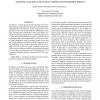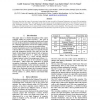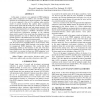66 search results - page 1 / 14 » Adapting acoustic and lexical models to dysarthric speech |
129
Voted
ICASSP
2011
IEEE
14 years 5 months ago
2011
IEEE
Dysarthria is a motor speech disorder resulting from neurological damage to the part of the brain that controls the physical production of speech and is, in part, characterized by...
127
click to vote
ICASSP
2009
IEEE
14 years 11 months ago
2009
IEEE
This paper applies two dynamic Bayes networks that include theoretical and measured kinematic features of the vocal tract, respectively, to the task of labeling phoneme sequences ...
111
click to vote
LREC
2008
15 years 3 months ago
2008
This paper describes the corpus of university lectures that has been recorded in European Portuguese, and some of the recognition experiments we have done with it. The highly spec...
120
click to vote
ICASSP
2008
IEEE
15 years 8 months ago
2008
IEEE
In this paper, we present a new approach to HMM adaptation that jointly compensates for additive and convolutive acoustic distortion in environment-robust speech recognition. The ...
131
click to vote
ACL
2012
13 years 4 months ago
2012
This paper presents a probabilistic framework that combines multiple knowledge sources for Haptic Voice Recognition (HVR), a multimodal input method designed to provide efficient...



